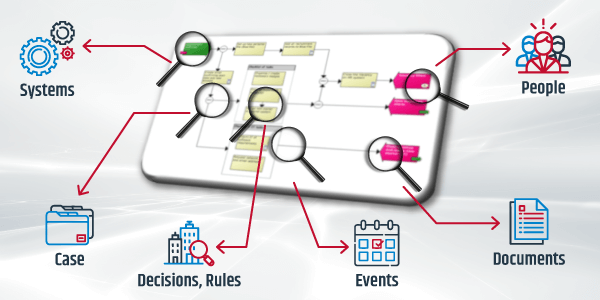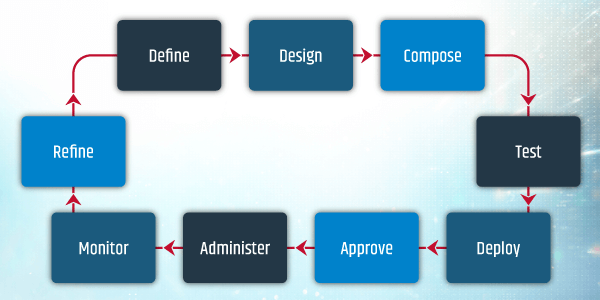Boost BPM for Oracle Approvals
In a fast-paced business world, optimizing operational efficiency and speeding up decision-making is crucial. Oracle Approvals, paired with efficient BPM, offers a potent solution for streamlining approval workflows. This blog explores strategies to boost BPM for Oracle Approvals, fostering quicker approvals, reducing bottlenecks, and boosting productivity.

Where do we start?
Prior to BPM Implementation: Understand your approval workflow. Analyze steps, decision points, and stakeholders to map the process. Identify pain points, improvement areas, and automation opportunities.
- Identify the Workflow Owner: Find the person responsible for the approval workflow.
- Document the Workflow: Gather the who, what, when, and where.
- Map the Workflow: Create a visual representation using flowcharts or BPM software.
- Analyze Problems: Identify common errors, Issues, and duplicate efforts
- Find Improvement Areas: Streamline and optimize decision-making
- Explore Automation: Use tools to integrate and automate decision-making

Streamline Approvals: The Power of Automation
Using Oracle BPM, you can automate approval routing, making the process faster and more efficient. You set rules based on document type, amount, and hierarchy to determine who approves what, eliminating the need for manual steps and reducing delays.
- Defining Approval Rules: Set rules for approvals based on document details.
- Configuring Oracle BPM: Create a process model with decision points and routing options.
- Decision Points: Use them to assess documents, e.g., check type or amount.
- Complexity: Consider scenarios like parallel approvals.
- Automated Routing: The system directs documents to approvers based on rules.
- Monitoring and Reporting: Use tools for tracking, identifying bottlenecks, and data collection.

Stay Informed: The Magic of Automated Alerts
Timely communication is crucial for efficient approval processes. Oracle BPM provides notification capabilities to keep:
- Timely Communication: Good communication is vital for efficient approvals.
- Oracle BPM Alerts: Use Oracle BPM’s alerts for timely updates.
- Automatic Alerts: Set up automatic notifications to alert approvers when they’re needed.
- Key Details: Include requester info, deadlines, and attachments for a clear context.
- Better Understanding: Giving approvers all the info helps them understand what’s needed.
- Speedy Response: Providing the right data in alerts encourages quick actions, making processes more efficient.
Instant Alerts: The Notification Revolution
In today’s mobile-driven world, enabling mobile and remote approvals is essential for agility and productivity. Oracle BPM offers:
- Mobile-Centric World: Acknowledge mobile’s crucial role in today’s fast-paced world.
- Oracle BPM Mobility: Use mobile interfaces for remote approvals.
- Anywhere Approvals: Enable reviews and approvals from any location for enhanced flexibility.
- No Physical Limits: Mobile approvals eliminate the need for physical presence or desktop reliance.
- Swift Decisions: Mobile approvals expedite decision-making in dynamic work settings.
Boost Approvals: Monitor for Success
Continuous monitoring and optimization are key to maintaining efficiency in Oracle Approvals. By using Oracle BPM’s monitoring and analytics capabilities, you can:
- Monitor Approval Times: Track time for approval completion.
- Find Delays: Identify and address process bottlenecks.
- Assess System Performance: Evaluate overall approval system effectiveness.
- Analyze Data: Use data to improve, streamline, and eliminate unnecessary steps
- Regular Reviews: Ensure alignment with goals through consistent performance evaluations.

Oracle BPM, like any other software solution, comes with its own set of challenges. Understanding these challenges allows organizations to proactively address them and maximize the benefits of Oracle BPM. Here are some common challenges associated with Oracle BPM:
Complex Implementation:
Implementing Oracle BPM for intricate approval workflows and existing systems is complex. It demands thorough planning, analysis, coordination, and resource investments.
Integration with Legacy Systems:
Integrating Oracle BPM with legacy systems poses challenges like compatibility issues and missing APIs. Plan carefully, utilize middleware, and explore Oracle’s Integration Offerings for seamless integration.
Ongoing Maintenance and Support:
Maintaining Oracle BPM is essential to keep it reliable and secure. This involves:
- Regular Upkeep: Routine Maintenance: Address issues, add features through regular upkeep.
- Resource Allocation: Assign resources for bug fixes, security, user support.
- Stability and Security: Ensure system stability and security with proper maintenance.
- Alignment with Business Needs: Aligns the system with evolving business needs.
Achieving Organizational Alignment:
Maximize Oracle BPM efficiency through alignment of business goals, processes, and technology. Prevent ineffective automation, redundancies, and underutilization by ensuring ongoing alignment for desired outcomes.
- Communication and Collaboration: Communicate and collaborate between business and IT.
- Business-IT Alignment: Ensure that the technology solutions align with the broader business objectives.
- Efficient Automation: Implement automation that complements and optimizes the existing processes.
- Continuous Evaluation: Continuously evaluate and adjust alignment.
Aligning effectively enhances Oracle BPM’s impact, streamlining approval processes. Understand workflows, automate routing, design user-friendly forms, implement parallel approvals, use automated notifications, enable mobile approvals, and monitor performance for faster, efficient approvals. Optimize Oracle Approvals with BPM to unlock organizational potential.
Learn more about how Apps Associates can help you – check out our website or our AppsAssurance Managed Services Data Sheet
